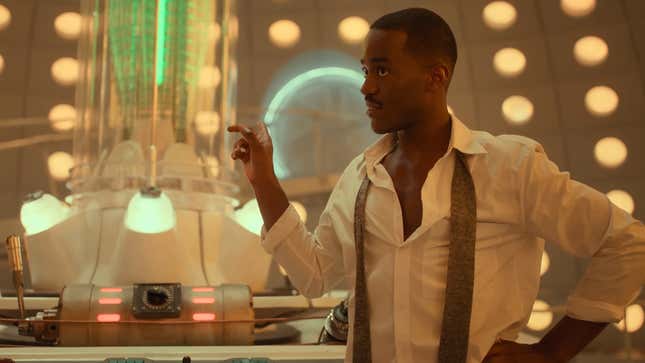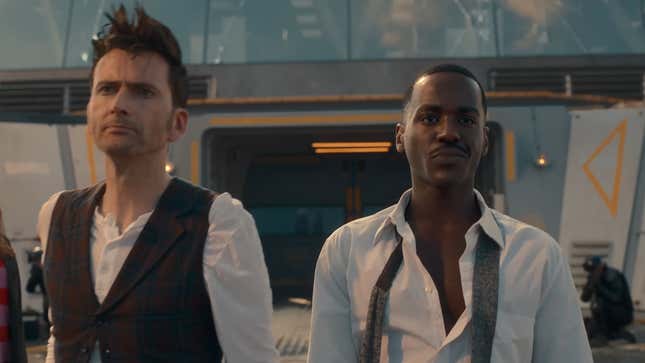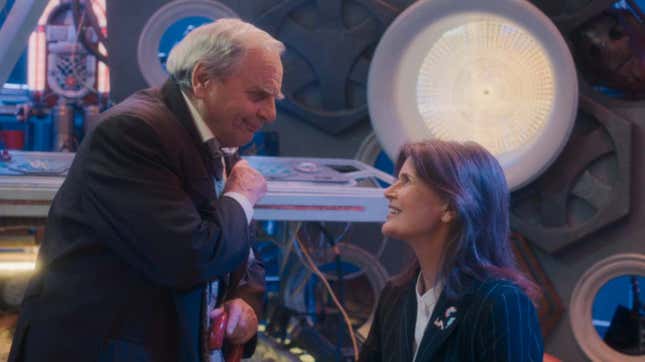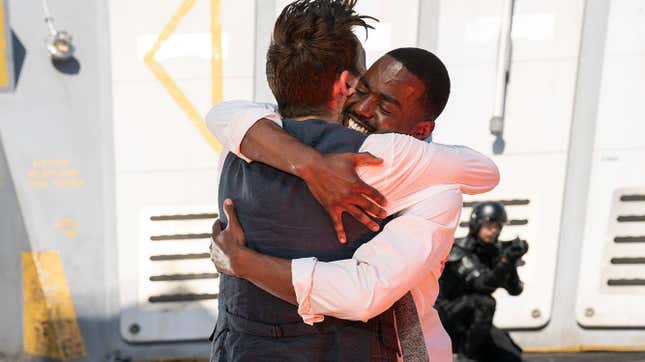
In contemporary fandom, canon is king. This is not a jab against an admiration of an ordered continuity and worldbuilding, the necessary aspects of creating a story to be lost in. But what goes beyond it—a yearning for raw, wiki-able data and facts that can be collated and held in amber, where interpretation gives way to a singular thesis—often threatens to override it. Which is why for Doctor Who, a show that has spent 60 years growing and changing and writing over and under itself, its latest shock is less about breaking its own world, but rather setting itself free.

It did so in the final act of “The Giggle,” the last of the three special episodes released over the last few weeks to mark Doctor Who’s 60th anniversary. Starring David Tennant not as a returning incarnation of the Doctor, but a new, fourteenth face, audiences came into the specials expecting one thing as their only guarantee: by the end of the third special, David Tennant’s latest Doctor would die, and transform into Ncuti Gatwa’s 15th.
Which he did... of a sort. Mortally wounded by classic villain the Toymaker, the 14th Doctor’s regeneration began just like every other contemporary imagining of the process has, inspired by Who’s long history—coalescing orange-yellow energies coursing through the Doctor’s body, preparing to explode in beams of radiant, transformative light. But here, they didn’t. Instead, the glow faded, and the Doctor, with the help of a push and a pull from his friends Donna and Mel, somehow split into two co-existent beings: the 14th Doctor and the 15th Doctor, together in one place.
“I’ve Bigenerated,” the 15th Doctor explains to his past self, confused onlookers, and the audience alike. “There’s no such thing. Bigeneration is supposed to be a myth, but... look at me.” It’s unquestionable in this, or any moment that comes after, that Gatwa is anything other than the definite article, although there have been valid concerns of the optics of making this choice with the transition from one of, if not the, most beloved actors to ever take on the role to the first Black, openly queer man to play it.
But the episode clearly establishes that this is the Doctor’s future staring right back at themselves—Time Lord rehab out of order, as 15 puts it later, imploring his past self to go on the journey of healing that has lead to his own currently revitalized lease on life. From the 14th Doctor’s future, his continued existence is not seen in so much as cheating death but once again, getting to see his own future reflected back at him. Ncuti Gatwa is the Doctor. David Tennant is the Doctor. It’s just that for the first time in Doctor Who’s long history of regeneration, we saw a version of the process that was less about physical death and rebirth, and more about divergence in time itself.

Part of understanding that divergence has been made all the more universal to Doctor Who beyond just this specific moment, thanks to returning showrunner Russell T. Davies. Speaking on a supplementary commentary track released to accompany “The Giggle,” Davies offered his own interpretation of what Bigeneration means:
“My theory... I think what with Peter [Davison] having been in, with with Colin [Baker] having been in, I think down the timeline, they all seperated. They all went like that, all the Doctors came back to life, with their original TARDISes, the gift of the Toymaker. They’re all traveling out there, I’m calling it a Doctor-verse. I want to create a future where, you know, Sylvester McCoy survived [the 1996 TV movie] and has an adventure! One of the things about [the first 60th special] “The Star Beast” is to get [David Tennant] back and get Catherine [Tate] back, we have to jump through so many hoops. Which is a great story, but it’s just like... ‘why can’t you just arrive and step out the TARDIS?’”

It wouldn’t be the first time recently that Davies proposed such an idea, either. In Tales of the TARDIS, a special anniversary miniseries cutting down classic Doctor Who episodes with new interstitials from returning Doctors and companions, it’s floated by the various Doctors that there are, in the universe, many intertwined timelines—timelines where, unlike the ones we saw onscreen, incarnations of the Doctor survived their regeneration stories and kept going, offering an explanation as to why Doctors can return looking older than when we saw them “die.” An interpretation then, as Davies put it, that realities can now intersect where all these Doctors, regardless of where they are in their own personal journeys and what we understood to be the end of those journeys, can come back. In one single moment, every Doctor becomes the Doctor forever, versions of themselves echoing out across time and space. It’s huge!
But it also isn’t. Because that’s all it is: an interpretation. None of these details, about what Bigeneration is and isn’t, are sourced from within the primary text itself—Doctor Who, the television show—and perhaps it should stay that way. In fact, part of what makes “The Giggle” so freeing is that all it makes actually explicit about this process is simply what our base understanding of what it is in the first place already was. The Doctor changes faces, and goes on forever. All we’ve added is that those faces can go on forever too, in whatever way we or the show might one day want them to. It might contradict things said in the past; in another 60 year’s time should we be blessed with both a livable planet and the continued health of Doctor Who, a new writer could completely upend “The Giggle” altogether and bring us back to our prior understanding of it all. Or they could do something completely different all over again! We don’t have a logical, scientific, biological breakdown of how the process works, right now Bigeneration is a vibe, a feeling. It is, as the Doctor himself puts it, a myth, and the whole point of myths and their persistence is that the story is retold and reinterpreted by different texts and perspectives across eons.

That’s the magic of Doctor Who, that’s the point of it: it carries on and it grows and it changes, all the time, forever and always. I don’t want to explain to you, reader, what Bigeneration is, because Doctor Who doesn’t want to right now either. For every once in a while, in a very long while when the wind stands fair, Doctor Who simply just ask us to have our own view on something, instead of treating its story as a series of definitive, immutable facts. On its own 60th birthday, it gives us this beautiful gift: to be free to imagine what might be for ourselves.
Want more io9 news? Check out when to expect the latest Marvel, Star Wars, and Star Trek releases, what’s next for the DC Universe on film and TV, and everything you need to know about the future of Doctor Who.